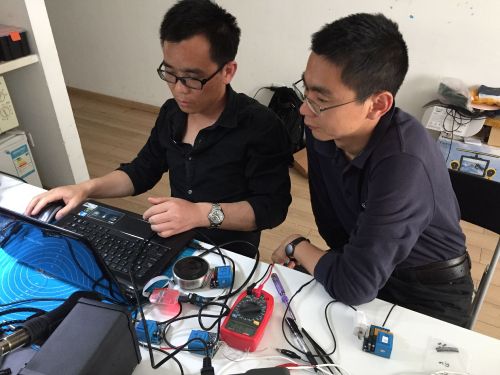|
 |
|
Xu Peiyou (right) and his colleague work at DropAir Labs (COURTESY OF XU PEIYOU) |
A ray of sunshine filters through a window installed with a Wi-Fi-enabled digital shade, illuminating the shoulders of Xu Peiyou, a 36-year-old entrepreneur who runs DropAir Labs. It's fitting for Xu, who has long held an interest in hi-tech gadgets, because he's lighting the way for Chinese innovative technology.
"After dabbling in software systems and big data, we shifted the focus toward smart homes, and more specifically, adapting Google's Nest Learning Thermostat to Chinese-made air conditioners," said Xu, who resigned from his job as a product engineer at a telecommunications company in 2011 and started a tech firm with his schoolmates from Sun Yat-sen University in south China.
While thermostats have been widely used in Western countries, China is still a relative stranger to them. In January 2013, Xu bought a Nest thermostat on Amazon.com and soon found that it was incompatible with domestic ally manufactured air conditioners, which usually follow different manufacturing standards from those in European and American markets. Since then, DropAir Labs has initiated the research and development of five generations of adapters, with which Chinese-made air conditioners can decode the instructions made by a Nest thermostat.
Xu's business vision was validated when Nest Labs was acquired by Google for $3.2 billion in early 2014. "Nest Labs thinks highly of Chinese consumers, and sooner or later, they will infiltrate the world's largest emerging market," said Xu, who believes Nest thermostats' distinctive functions will also help it win favor with Chinese users. To name but two, it can automatically learn the habits of its owners and build a schedule, and based on the data it collects, work out how much time it will take to reach a certain temperature.
Since Nest thermostats are customized for European and American users, most of whom reside in single-family houses, it can only be applied to central air conditioners. "Currently, our clients are affluent people, because most Chinese people still dwell in apartments," said Xu, admitting that only a mere 10,000 adapters have been sold in China.
However, Xu has refused to settle for such a small return and is setting out to break new ground.
"The number of wall-mounted air conditioners in China is quite sizable—about 300 million units, which means enormous opportunities," said Xu, noting that DropAir Labs has been ready to develop thermostats tailored for Chinese consumers and holds high hopes of getting all the existing wall-hanging air conditioners intelligentized.
"I expect our products can incorporate the powerful features of Nest thermostats as well as meeting local needs," said Xu. In recent years, constant haze has made air quality a priority for Chinese consumers.
Its Chinese-customized thermostat will connect the air conditioner with an air purifier, humidifier and primary air system, which make up an internal network and create an environment of high-quality air, constant temperature and humidity. The product design has been basically finished.
DropAir Labs plans to peg the new product at 150 yuan ($24), much lower than the retail price of the Nest Learning Thermostat, which is $249. "A low price is a major selling point in an undeveloped market like China," said Xu.
And yet, as always, realizing an enterprise's full potential represents an uphill battle. As a start-up, running costs are still a heavy burden for DropAir Labs, Xu said, explaining that he pays rent of 60,000 yuan ($10,000) a year for his 25-square-meter lab and has to pay an extra 8,000 yuan ($1,300) a year for another address to get the company registered. "We expect authorities to unveil more tax credits and favorable policies for start-ups," he said.
After consulting with a dozen of venture capitalists, in May, Xu founded his first capital provider Lebox Capital, an angel investment fund.
"By now, we have accomplished the Chinese version of the Nest mobile application and instruction books," Xu said, adding that he has been striving to cement cooperative relations with the world's largest programmable thermostat manufacturer.
"I'm used to hunting for the most advanced or ingenious intelligent hardware novelties on the Internet, and probing into their functions to enhance the design of our own products. After all, a person of narrow view will in no way achieve success in a now innovation-oriented nation," said Xu.
It's obvious that he's in no danger of sticking to small horizons.
Copyedited by Kylee McIntyre
| 